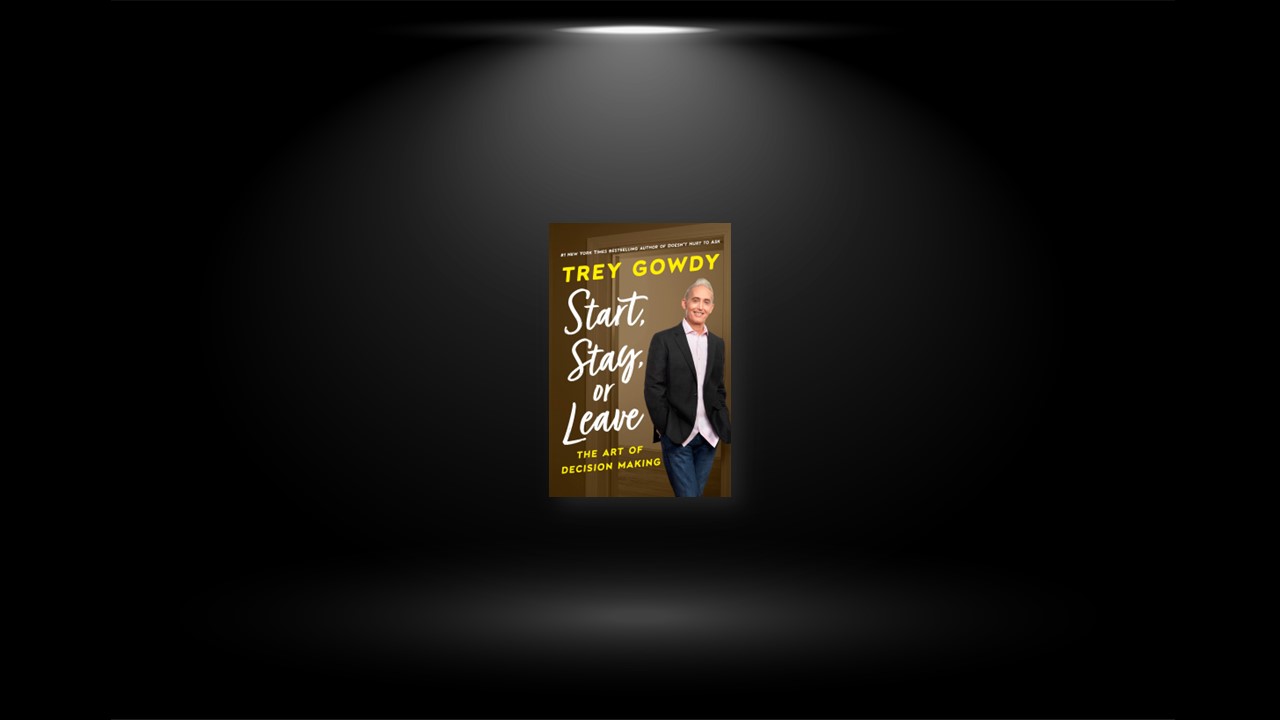Start at the End
As you’re thinking about starting something—whether it’s a new career or a new relationship, a new hobby or a new investment, starting fresh in a new city or starting to get more serious about your health—whatever it is the author has found it’s best to start at the end. By creating a clear picture in your mind of your final destination, you will be better equipped to make decisions that ensure you reach that desired place.
Look in the Mirror
Your decisions in life will determine your success. But first, your most important decision will determine what success looks like in your life. Define success in terms of what you can control—your words, your mindset, your effort. The small decisions we make every day matter: choosing to use respectful language when you get in an argument with your boss, deciding that you are going to be optimistic about the outcomes of the projects you are working on, opting to read this book rather than watch TV, planning to go on dates with or give gifts to your significant other to show you care. When you decide to control your daily actions, you can derive your sense of fulfillment from active choices you make rather than only outcomes, a more stable and sustainable way of approaching success.
Consult Your Dreams
Every decision you will make will have a unique balance sheet of facts, and you, the one and only accountant of your life, will be singularly well situated to interpret that balance sheet as you try to make the best decision. When weighing the risks and rewards, pros and cons, passions and obligations, we often discover that there is a dream, a hope, a goal, an aspiration pulling us in some direction despite what others might consider a more prudent course. It has happened to the author and glad he did not listen to the voices of “prudence,” even when one of the voices was his own.
Staying to Build
Deciding to stay where you are rather than chase a different dream may sound like a consolation prize. But staying isn’t just about not pursuing a particular path; it’s also about taking inventory of where you are, putting in the effort to build a better goal, and giving your initial decisions the gift of time and patience.
Dreams can only become reality with perseverance, work, and patience. Stick with them until they’ve fully run their course or until your main dream changes. Don’t chase every whim that captures your attention. There are times when no change is the best decision we can make; change isn’t necessarily progress. Staying may be difficult, boring, and thankless, but remember that you are building something that will live beyond you.
The Power of Priorities
Priorities help keep us grounded. When we have clear and unshakable priorities, we can put every other part of a decision—those aspirations pulling us, the pros and cons, the risks and consequences—into perspective. Priorities shape which areas of our lives we focus on building and encourage us to stay put even when something new and shiny is calling our name.
Dreams, especially attainable ones, can sometimes distort our priorities. When weighing the decision to stay where you are or leave and start something new, take a hard look at your priorities. Which dreams are at the forefront of your picture of the end, and which are in the background? Which dreams need to happen now as opposed to later on? What are the windows of opportunity? Which of your dreams can you pursue concurrently? Which dreams conflict?
The Attainability of Dreams
As we weigh the decision of staying where we are, we must allow emotions and logic to temper our dreams—though never to extinguish them. By taking into account our motivations, our means, and our opportunities, we can decide which dreams we are meant to pursue.
Sometimes starting something new is the best decision to get you closer to your closing argument. But other times, what you aspire to do or be can distract you and taunt you with its unattainability. When you consult your dreams, it is imperative that you be honest and aware of their achievability, because this is what will inform how big of a role they play in your life. It is more than okay for something to remain simply a “daydream” so you can stay focused on your day job.
Shelf Life
Deciding to leave can simultaneously be one of the most challenging and liberating acts. Leaving can be scary, sad, exhilarating, difficult, relieving, necessary, or all of the above. Knowing when to leave can only be determined by honestly assessing both your current situation and who you want to become in the next season of your life.
When you are at a crossroads trying to determine whether to leave, part of your hesitation may be due to the fact that what you are doing now was once your greatest aspiration. Stepping away often means leaving a dream behind. It can be tantamount to the end of an era or the death of a desire that once kept you feeling alive. It can even feel like a self-betrayal, turning away from something you once claimed to hold dear.
At this moment of decision, you need to make certain you are the keeper of your dreams rather than the other way around. Your goals and aspirations should be liberating, not debilitating. Your dreams should not be full of dread and angst. They should make you better, not more cynical.
One of two things happens with our dreams when we make healthy decisions: They evolve with us, or we retire them for our betterment. If you allow them to become chains, you will suffer under the weight of them.
Regrets and Remembrances
Sometimes we make the right decision but things turn out poorly. Sometimes we make the wrong decision and no harm is done. A decision may seem like a mistake in hindsight, but maybe we are looking at the wrong part of the picture. Often, with a change in perspective, we can turn our regrets into remembrances that can guide us as we enter the next chapter of our lives.
We cannot pursue every opportunity in life. We have to say no to many opportunities, and in doing so, we leave those paths permanently in the rearview mirror. We should not waste time looking down paths we can no longer take. Rather, we should focus on the lessons we learned on the road we actually traveled.
When we consider past decisions, it is well-nigh impossible to separate the various threads of life from one another. A poor vocational decision may turn out to be one of the best relational decisions you’ve ever made. A poor educational decision may result in a spiritual blessing. To fairly judge the decisions we have made, we must consider all of life’s spheres and spectrums.
Selectively Selfish
Making decisions based on outside forces that may not have your best interests in mind will leave you lost and lonely. Counsel and advice from people who know you and love you are essential. Gaining the approval of the crowd—whether that be your social media followers, the company you work for, or acquaintances who have yet to prove themselves as friends—at the expense of yourself, your time, your energy, and your well-being is rarely a good decision. Ultimately, trust yourself.
Outside pressure will come from people you love and from strangers. It will come from people who need something from you and people who want to see you fail. But none of these people know you the way you know yourself, and you have to remind yourself of that when you are at a crossroads. They don’t have the full picture of the desires, consequences, dreams, burdens, risks, feelings, and fears that come with this decision; you are the one who knows those things best.
When you are imagining the final photograph of your life—who is in it and what you accomplished—make sure that you know beyond a shadow of a doubt that you are the one who orchestrated that photo. Make sure it accomplishes your vision and not someone else’s. You are the author of your life, so make sure your decisions reflect that.


